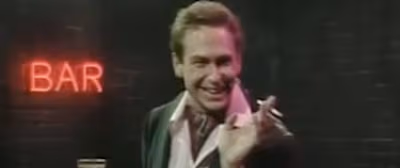Oscar Isaac and Rachel Brosnahan decode ‘The Sign in Sidney Bru…

Oscar Isaac and Rachel Brosnahan in the new BAM revival of 'The Sign in Sidney Brustein's Window' (Photo by Catalina Kulczar)
Mar 17, 2023
"It's a very provocative play": An interview with the stars of the revival of Lorraine Hansberry’s final opus, currently running at BAM
Oscar Isaac is grappling with the massive scope of ideas in Lorraine Hansberry’s final play, “The Sign in Sidney Brustein’s Window,” while focusing on the smaller details of his own life. He is brewing a pot of coffee in his Brooklyn flat.
“It’s an epic, and there’s no one thing to hang your hat on,” the actor says over Zoom. “But there’s this profound marriage at the center — two people who have lost faith in each other’s dreams.”
In the play, currently running at Brooklyn Academy of Music through March 24, Isaac plays Sidney Brustein, a progressive who’s given up on revolution, but not its ideas. Rachel Brosnahan, of “The Marvelous Mrs. Maisel,” plays Iris, Sidney’s wife and a struggling actress from the Applachians. She is undermined by Sidney’s belittling throughout the play, but she’s also finding strength in therapy. Of course, Sidney is skeptical of therapy, too.
In the play, Sidney is caught up in progressive rhetoric, with friends who represent every imaginable ideal. Except they aren’t exactly revolutionaries. Sidney and his coterie of hip pals are more like burned-out Marxist professors than crackling insurgents.
Leading up the play’s original run on Broadway in 1964, Hansberry wrote about the type of ingratiating liberalism the play skewers for The New York Times.
“The American theater (and motion pictures) concept of an ‘intellectual,’ it seems to me, is someone who wears horn‐rimmed glasses and exceedingly attractive tweed sports jackets and speaks in stilted phrases until they are shown true ‘life’ by some earthy mess of a girl in black stockings,” wrote Hansberry.
Critics didn’t appreciate the play’s critique of pseudo-intellectualism and it only lasted 101 shows. “Sidney Brustein” closed two days before Hansberry died of pancreatic cancer at the age of 34.
Hansberry, a queer Black playwright, also famously authored “A Raisin in the Sun,” consistently ranked among the best American plays ever written. “Sidney Brustein,” on the other hand, was big and messy at a time when plays were tidy and more easily digestible.
The play briefly reopened in the 1970s but wasn’t restaged until director Anne Kauffman revived it at Chicago’s Goodman Theatre in 2016.
Kauffman has worked for years at the New York Theatre Workshop and Playwrights Horizons, but it’s taken 15 years to mount a production of “Sidney Brustein” in New York. Finally, BAM helped rebirth the play this spring.
“I love the fact that we’re doing it in Brooklyn,” says Kauffman. “Brooklyn feels like the West Village of the ‘60s, so it feels totally appropriate to do it here.”
Brooklyn Magazine spoke with Oscar Isaac and Rachel Brosnahan about reviving “The Sign in Sidney Brustein’s Window” in 2023.
Oscar, Pedro Pascal said you were “naughty” when you both starred in the play “Beauty of the Father” in 2006. Have you done anything mischievous to your current company?
Isaac: It’s not so much about pranks or jokes, it’s about operating from a place of disobedience: not doing what you’re told, doing what you’re not supposed to do, laughing at the wrong moment. For me, that’s part of the appeal of being an actor, to explore that space. Our whole rehearsal for “Sidney Brustein” was a real act of subterfuge.
“Sidney Brustein” is the first play you’ve done since “Hamlet” in 2017. What brought you back to the theater?
Isaac: Well one, it’s around the corner from my house. So it’s nice to be able to walk to work. We did two readings of it and I found it really compelling. The nature of the play is so unique and vital. It’s one of those things that’s like a magic trick that often happens with Shakespeare as well. You feel like time collapses and this piece written in a specific time and place feels like it’s talking to you right now.
Rachel Brosnahan: For a while, I lived across the street from BAM when we were shooting “Maisel,” so it does feel very full circle to be back.
Do you have some places in Brooklyn you like to hang out?
Brosnahan: I really love Fort Greene Park! I lived very close to it when we were shooting “Maisel.” I’ve been to Laser Wolf in Williamsburg a couple of times, and the food is incredible. So that’s definitely a favorite. I also have a love affair with the burgers from Andrew’s Classic BKLYN Luncheonette. They make one of the best smash burgers in the city, in my opinion.
The play wasn’t appreciated in 1964, but now it’s coming into its own. Why is that?
Isaac: It was ahead of its time. Lorraine Hansberry, as all great artists do, she risked and shocked and provoked with this play. It’s not what was expected of her after “A Raisin in the Sun.” It’s a very provocative play, even for now, decades later.
Brosnahan: I imagine it was uncomfortable for people to see this young, black, queer woman making valid criticisms of white progressives. And it is a messy play, but it’s a messy play by design. Hansberry embraced the messiness of all of these people and really made space for them. One of my favorite things about this play is that every role, no matter how much real estate they occupy in the play, is so fully developed. She gives each character the space to think and to grow. I certainly think that made people uncomfortable.
Oscar, tell me about your character Sidney.
Isaac: He’s someone that has become disillusioned with the nature of revolution and insurgency and politics. There’s been a lot of effort on his part to little result, and he’s starting to withdraw from all of that. He’s still seeking some solace in the music scene, in possibly a newspaper that he would dedicate to the arts. He has dreams of just leaving it all and going to live in the woods. He’s also married to a young woman who has a lot of ambition and a lot of aspirations, and a lot of unfulfilled dreams as well. So Sidney’s navigating this desire, this longing, this feeling like there’s no place for him with his responsibilities to his wife, his friends, and also to himself. He’s trying to stop himself from feeling and it’s not going great.
Rachel, how does it feel to play Iris, the part Rita Moreno originated on Broadway?
Brosnahan: I’m deeply honored in every sense of the word to be able to say these words and to be a part of bringing this play back into public consciousness because there have been so few productions of it. It’s such an important piece that feels almost more relevant than ever. Lorraine was so ahead of her time and we’re still catching up to her. And Rita’s a legend! I know Oscar has spoken to her a bit about the play and her experience.
What did she say about her experience with the play in 1964?
Isaac: She said it was incredibly challenging. That Lorraine was sick, and so she was sending her notes back and forth from where she was staying. Figuring out the play was incredibly challenging because of that, and it was such an incredible snapshot of that moment of what was happening on Broadway as well. Everyone came together to keep the play going.
Rachel, what’s Oscar like as an acting partner?
Brosnahan: He’s been the best. He’s so curious and generous and incredibly smart and thoughtful in his approach to this piece. This is our first time working together, but I imagine that other folks who have worked with him in the past would say the same. We’ve just had a lot of fun. I think our finding the parts of this play, that while there are so many big questions and so much complexity as it relates to those questions, that there are actually a lot of fun and really funny moments in this play as well. It’s been great to discover those together.
Broadly speaking, the play is a black critique of white liberalism. Specifically, that even when white liberals have good intentions, they can still make a mess of things. Talk about that aspect of the play?
Isaac: There’s absolutely an element of that. And yet, I think Lorainne goes even deeper. I think she goes even more esoteric in some ways. That’s what makes this play transcend the politics of the time and also of our time right now. Lorainne plays with identity and labels, so to move into white liberals as a label, that’s a part of it. But it’s also, on a very human level, this idea that you think you’re doing the right thing, but it doesn’t result in what you’d hoped it would be. It’s a story about coming to terms with your own will and the great void that sometimes comes with living. She was writing this as she was staring into that void, as she was dying, and these are the last messages that she sent. That’s why for me they feel much more profound than just a political critique of white liberals, which is in the play, but there’s also so much more. She critiques everyone. No one is spared in this, which is amazing.
Who else does Hansberry criticize in the play?
Isaac: We have two Black characters in the play, but particularly Alton Scales, a character who is white passing, as she describes him. He gets blinded by concepts. I think that’s also what she was playing with, that it’s easy to get lost in the conceptual. You can pour a lot of faith into social concepts, political concepts, moral concepts. Lorainne’s trying to get in touch with the elemental in the play. Getting in touch with that thing actually can move one towards action in a deeper, truer, more authentic way.
Rachel, Iris is written as half Greek and half Irish-Cherokee. Does this version of the play keep the original ethnicities as written?
Brosnahan: We’re sticking true to the characters as Lorraine created them. There’s certainly a lot of complex conversations about identity in the play, and it’s been a really important and exciting challenge to unpack that as we move through the piece. We’re deep in it and deeply committed to bringing Lorraine’s vision back to life.
The final season of “The Marvelous Mrs. Maisel” debuts in April, and I presume it ends in the early 1960s, right around the time this play was produced in 1964. Your character Miriam Maisel finds liberation from her conservative relationship, so how does it feel to play a different character on the brink of liberation from a progressive relationship in “Sidney Brustein”?
Brosnahan: It’s a total coincidence that the time period is so close together. To your point, it’s been really different in a way that I’m enjoying. There’s a common theme that both women are deeply courageous and have unwavering honesty. But their trajectories are quite different. Midge was content to be the perfect model of a 1960s housewife and when the ground fell out beneath her, she began to figure out a different way to use her voice and her talents and to grow. For Iris, she would be one of the people in the audience at Midge’s shows. Iris is deeply entrenched in this downtown, bohemian world and is caught between two waves of feminism. In the play, there are three sisters who represent different critiques of normative womanhood and also different waves of feminism. Iris being the middle sister is caught between those worlds. She’s someone who really doesn’t know who she is and what she wants. Her role in this play is about her beginning to articulate that for herself.
Like this project
Posted Sep 21, 2023
"It's a very provocative play": An interview with the stars of the revival of Lorraine Hansberry’s final opus, currently running at BAM
Likes
0
Views
5





